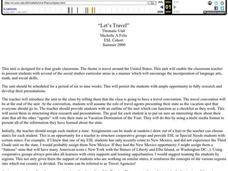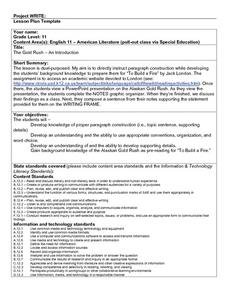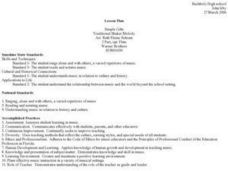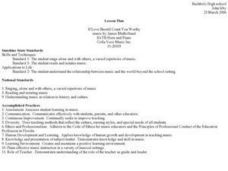Curated OER
Geometric Shape Dances
Students use movement and dance in order to strengthen mathematical understanding of different geometric shapes. The movements are imitating the drawing of shapes and they pick one to make into a dance. Upon beginning the dance music can...
Curated OER
Spatial Relationships: an Over/Under Dance
Students explore the relationships of space through movement. Two perform movement improvisation based on over/under. The activity improves hand-eye coordination, cooperation, and communication skills. The timing of the dance also...
Curated OER
Tempo Contrasts in partner Dances
Students explore the differences in tempo through movement. In groups, students create an original dance phrase and illustrate both fast and slow movement. They share their observations and evaluate each dance according to originality...
Curated OER
Locomotor Dances
Students explore and perform locomotor movements. With partners, they combine the locomotor movements into a simple dance. The partner identifies three movements they observed. Students may be grouped into dancers for a performance.
Curated OER
Human Number Line
Students compare different types of numbers. Each student is given a flashcard containing a decimal, percent, fraction or integer. Teams of students compete, in silence, to determine who can line up in numerical order correctly. They...
Curated OER
Edible DNA
Pupils use multicolored soft candies (gumdrops and candy orange slices) and toothpicks to create models of DNA structures. They discuss the fact that DNA must copy itself before splitting into two cells. Students demonstrate this by...
Curated OER
Tales From The Tummy
Learners use creative writing in order to review the digestive system and other various parts of the human body. They write a creative story about a hamburger and the journey it takes during digestion. The lesson includes key words that...
Curated OER
Geothermal Features of Yellowstone
High schoolers explore the geothermal features of Yellowstone National Park. Through a PowerPoint presentation and the use of a Smart Board, students recognize the four geothermal features. They discuss the differences of each feature....
Curated OER
The Atomic Bomb Dilemma
Students examine consequences of using atomic bomb in light of resulting peace, distinguish between fact and opinion and analyze sources to recognize bias and points of view, and assume role of reporter, critic, cabinet member, or...
University of New Mexico
Let's Travel
Fourth graders work in groups to research various locations across the United States. They present their findings to the class, participate in a travel fair, make phone calls to tourist agencies and write letters to state tourism...
Curated OER
The Civil War in Historical Fiction and Historical Accounts
Eighth graders examine life during the Civil War through various readings. They compare and contrast a novel they read in class to one they chose on the subject. They work together as a class to produce a newspaper displaying the...
Curated OER
Classification 2
Students discuss what makes a living thing (for example, cellular respiration) and collect a selection of living things from outside. They divide their organisms into plants and animals and create a key for the divisions.
Curated OER
Desert
Students explore desert landscapes and the animals that inhabit the desert. They discuss deserts and the animals that live there. Students compose a story using the correct sequence and illustrate the story with items they would find in...
Curated OER
Eggs
Third graders examine a variety of information about eggs. They complete a class KWL chart, and read "Green Eggs and Ham" and "The Eggs Are Hatching" by Monica Incisa and discuss the fictional and non-fictional aspects of each book. In...
Curated OER
Patterns on Parade
First graders discover that patterns exist in sounds, movement, and objects. In this patterns lesson, 1st graders select two items from a group and produce an alternating pattern.
Curated OER
Houdini Report
Students write a biography after thy have found facts from the Houdini website. They complete a report using the organizational trait. Students use the internet to complete their fact sheets on Houdini. They discuss organization and...
Curated OER
The Gold Rush: An Introduction
Eleventh graders study the Gold Rush in relation to "To Build a Fire." They research a website and view a Power Point presentation on the Alaskan Gold Rush. They write notes on a graphic organizer and write a sentence supporting their...
Curated OER
Heredity (Mendelian Genetics)
Students observe and record observations of whether a person is a taster or nontaster. They test selected individuals from their families and peer groups and chart all findings to determine which trait (e.g. taster or non-taster) is...
Curated OER
Amphibians-Frog Dissection
Pupils compare the anatomy of a fish to an amphibian and that of an amphibian (frog) to a human. They complete a virtual frog dissection to gain some experience prior to the real dissection.
Curated OER
Simple Gifts
Students explore music. They practice singing with correct posture. Students practice reading music using the correct rhythms. Students also learn the intervals Major 3rd and Major 6th.
Curated OER
Music - O Brother, Where Art Thou?
Students practice singing with correct posture. They sight read music and sing in choral harmony. Students identify the characteristics of a melody and examine the style of Southern Baptist hymns.
Curated OER
If Love Should Count You Worthy
Students sing "If Love Should Count You Worthy" by James Mulholland for SATB choir, horn, and piano and a version of "The Drinkin' Gourd" in this High School choir lesson plan. State and National standards for Music are emphasized.
Curated OER
The Great Kapok Tree Debate
Young scholars participate in a read aloud of the story, "The Great Kapok Tree" in which a logger decides not to cut down a tree. In small groups, they discuss and write about their opinion on the logger's decision. Each group then...
Curated OER
Prereading
Fourth graders participate in think-pair-share reading strategy in this lesson. They identify their purpose for reading as well as purposes for reading fiction/nonfiction. They list and discuss several prereading activities, and then...

























